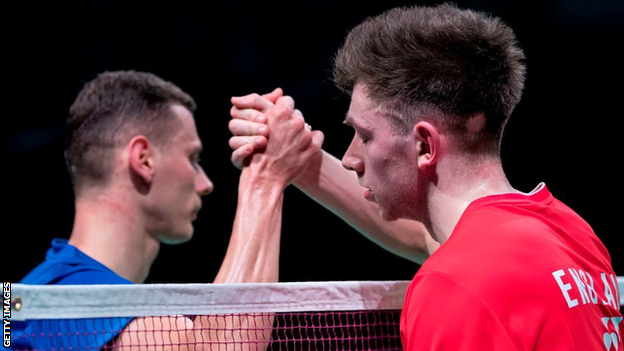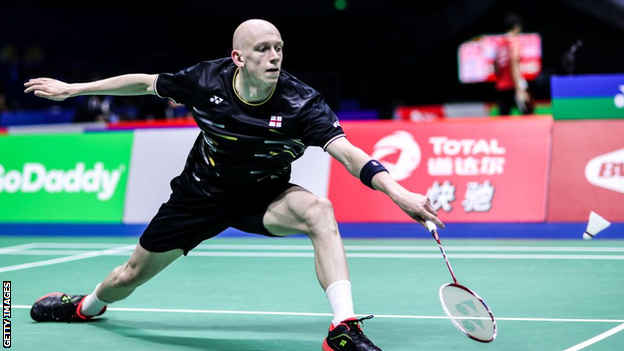Toby Penty: England number one on alopecia struggles
- Published
I really struggled when I lost my eyebrows - Penty on alopecia
It was after Toby Penty went for a haircut that his mum first noticed a small bald circle on the back of her son's head.
Penty shrugged it off. Business carried on as usual for the man who was then England's number two badminton singles player.
That was November 2018. Eighteen months on, Penty has lost every hair on his body having been diagnosed with alopecia - and it's unlikely it will ever grow back.
Things have been tough for the 27-year-old, with only his sport providing a sense of normality as he tried come to terms with his new appearance.
"It was a mixture of anger and sadness," he tells BBC Sport. "I felt my identity had gone initially, especially when the eyebrows went. That's when I really struggled because it looked like someone different when I looked in the mirror."
Only now does Penty feel ready to tell his story. Only during lockdown has he had time to reflect on all he has gone through.
"There were a lot of times over the last year or 18 months when I wished I could have put my racquet down for a longer time and focused on myself a bit more," he says.
"As much as I wouldn't have wanted it to be a pandemic that stopped me from playing, personally it's been the best thing that could have happened for me to be able to take some time to myself."

Bald spots first appeared on Penty's head in November 2018
A month after discovering that first bald spot, more had appeared and Penty - now England's number one - sought medical advice. He spoke to his team doctor before seeing his GP, who suspected alopecia areata, which typically affects only the scalp.
"There wasn't really much they could recommend for it, it was one of those things to wait and see how it progressed," Penty says. "That was quite frustrating.
"The longer it went on and the more apparent it was, it was quite scary in the fact that it only got faster. It wasn't like it was a little bit every day, it was happening more and more and it was more and more hair coming out.
"I'd finish training and go and have a shower, then I'd dry my hair and there was loads coming out."
As time went on, it became apparent that Penty had a more advanced, and rarer, type of alopecia - alopecia universalis - that affects the whole body. His hair loss continued until August, at which point reality hit.
"I think it hit me harder after the whole process finished, because after my head, it was my eyebrows, my eyelashes, my chest...," he says.
"It was easier to process when it was happening, but once it stopped and I realised I had to come to terms with this and not knowing whether it was permanent or whether my hair would come back, that's when it really started to hit me."
By that stage Penty had already decided it was time to "take the plunge" and shave his head. In an Instagram, external post, he described standing outside a barbers and feeling "more nervous" than he had before any badminton match.
The walk home, he said, was the "lowest I've ever felt".
"I probably could have kept what was on top, but I knew it was only going to get worse, and at the time I was really struggling with it so I thought the best thing to do was to try to face it head on," he says.
"I remember asking for a grade one or two just because I wanted to see how bad it was, and when he finished, that's when it really hit me because there were so many bald spots."
In December, Penty had micropigmentation on his head, with natural pigments tattooed on his scalp to give the illusion of hair follicles.
His confidence boosted by the procedure, he hopes - in time - to do the same for his eyebrows.
"It's small steps to making me, at least when I'm looking in the mirror, feel more like myself."

Penty is ranked 52nd in the world in men's singles
Badminton provided a "bubble" in which Penty could forget - about his changing appearance, and the anger, sadness and confusion it was causing.
But, towards the end of last year, he found himself having "more frustrations" on court despite his performance level not dropping, and it was "hitting him harder" off court as well.
As a result, with a little encouragement, he sought professional help that eventually enabled him to see a little light at the end of the tunnel.
"At the start, I didn't really want to talk about alopecia or even the word. I had dissociated myself from it," he says.
"Seeing a psychiatrist helped massively. I don't think it is something I would have sought out myself, but it was the Badminton England physio and team doctor who noticed how much it was troubling me, and they were the ones who put me in contact with a psychiatrist.
"It helped me to understand things a lot better and a lot clearer. It's been a gradual thing to come to terms with but that was definitely the first step."
There will no doubt be further hurdles for Penty to overcome, but he has learned a lot about himself over the past 18 months.
"It's taught me when I need to be in what I would call a comfort zone, and knowing when I need to push out of that a bit more," he says.
"I feel like I tried to rush myself into feeling good about myself again rather than letting this process take the time it needed.
"I think nowadays we are always trying to rush everything. I think it's OK to give yourself time, and that's something I have learned - that time is a good healer.
"It doesn't matter how long it takes for me to feel better about myself and my appearance, as long as I get there in the end."